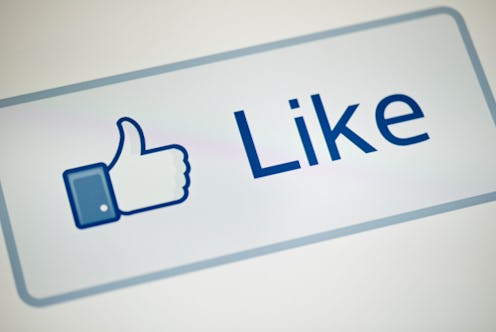In our plugged-in, high-tech world, it's easy to feel like how much people like or care about us is correlated with the amount of attention and activity we get on the internet. For example, there are many people who get a self-esteem boost from watching the "likes" on a Facebook status or retweet mount up — and indeed, it turns out that there's a reason why some people care about social media "likes" more than others do. It all comes down to one thing: Whether or not you have a "sense of purpose" in life.
According to recent research out of Cornell University (called, appropriately, "How Many Likes Did I Get?"), people with a strong sense of purpose are less likely to experience the "rush" of positive self-esteem associated with "likes" and positive attention on social media. (People who were determined to have a strong sense of purpose agreed with statements like, "To me, all the things I do are worthwhile" and "I have lots of reasons for living" on a questionnaire.) Published in the Journal of Experimental Social Psychology, the study consisted of two separate experiments.
In the first, researchers gathered 250 Facebook users from across the United States, measuring their levels of self-esteem and sense of purpose and taking a count of how many "likes" they typically got on the photos they posted. Facebook users who reported getting more "likes" also reported having higher self-esteem. Interestingly, those Facebook users who had a high sense of purpose, however, reported feeling no impact on their self-esteem when they got a high number of likes.
For their second experiment, researchers gathered 100 students from Cornell University. Students were asked to take selfies and post them to a fake social media site called "Faces of the Ivies." Students were then told if their selfies received a high, low, or average number of "likes." Students who got a high number of "likes," even on this fake website, experienced a higher level of self-esteem if they lacked a sense of purpose. For students who got a high number of "likes" but had a sense of purpose, there was no change in their self-esteem.
This study is just one of a growing body of research about the way social media can impact our self-esteem. For example, in an article from 2013, which was published in PLoS ONE, a group of French researchers found that the more time we spend on social media sites like Facebook and Twitter, the more we compare ourselves to other people, and the more depressed we get. There are reports from individuals, too, who express feeling anxiety and low self-worth if they share on social media and get few "likes" or positive responses.
It's interesting, though, that this study suggests that specific types of people might be more likely to experience these kinds of emotional ups and downs inspired by social media than others. In a way, though, the results make sense: If you have a good sense of self, you're probably happy with your own goals and ideas and the way you view yourself as a person; therefore, you may be less likely to have pronounced reactions to positive attention (including Facebook "likes," Twitter retweets, and Instagram faves), because you're not necessarily searching or grasping for it. This is in comparison to those phases in your life where you're feeling pretty low and crave positive reinforcement or self-esteem boosts — on those days, knowing that a joke you made on Twitter got retweeted a number of times can seem like the best thing in the world, while their absence can feel upsetting.
No matter how you use social media, it's pretty clear that it can have an impact on our lives. Hopefully the more research advances, the more we can better understand the impact our social media presence and interactions has on our perception of ourselves and our health and happiness.
Images: Giphy (3)
